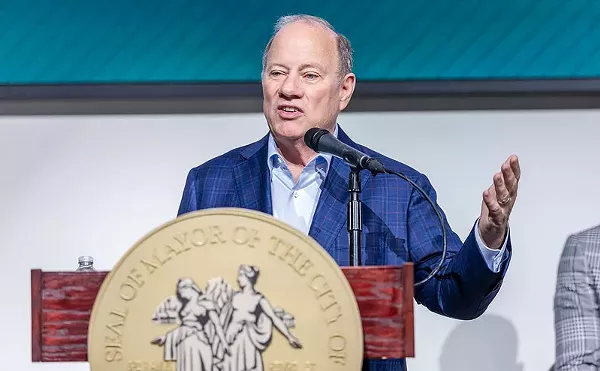
Audio By Carbonatix
[
{
"name": "GPT - Leaderboard - Inline - Content",
"component": "35519556",
"insertPoint": "5th",
"startingPoint": "3",
"requiredCountToDisplay": "3",
"maxInsertions": 100,
"adList": [
{
"adPreset": "LeaderboardInline"
}
]
}
]
In the first of a series of postings he's doing this week for the website greatlakestownhall.org, David Poulson references a joke about newspapers from the Daily Show's Jon Stewart, who recently quipped, "What's black and white and completely over?"
We go to press on Monday, so, by the time you read this, the Detroit dailies should have announced some big change. Last week the Wall Street Journal, on its website, reported that the likely announcement will involve The Detroit News and Free Press making home deliveries only three days a week; the rest of the time subscribers will have to get their news from the Web. It's the same story this rag's Jack Lessenberry reported a few days earlier.
Whatever the Big Change turns out to be, it's reflective of the throes newspapers are enduring. And what Poulson — a longtime reporter and editor who's now associate director of the Knight Center for Environmental Journalism at Michigan State University — wants people to understand is that the cutbacks being made at papers across the country affect way more than the journalists receiving pink slips. And one of the things being imperiled — especially here in this region — is the quality of our environment.
"When a sewer fails, water suffers," writes Poulson. "Level a forest and the critters flee. ...
"But what's the impact on the Great Lakes environment of a failing system of news and information? Huge."
In a previous piece, Poulson detailed some of the cuts under way:
• Booth Newspapers — with dailies in Grand Rapids, Flint, Ann Arbor, Muskegon, Kalamazoo, Jackson, Bay City, Saginaw — offered buyouts to employees with as little as five years seniority. In some cases, nearly every journalist in a newsroom could qualify.
• Gannett Co. — a nationwide chain with papers in Lansing, Detroit, Port Huron, Battle Creek — says it will lay off another 10 percent of its staff in local newspapers by early December. That follows a 3 percent cut announced in August. More may come before year's end.
• The struggling Journal Register Co. said ... it is selling some of its newspapers. In Michigan, the company owns papers in Pontiac, Mount Pleasant, Mount Clemens, Royal Oak and Shelby Township.
The point of all this, writes Poulson, is this: "In a nutshell, news operations already downsizing for the past several years, are in real trouble. They're cutting beyond the bone. In the past six weeks, employee layoffs and buyouts have accelerated."
Fewer reporters and editors means those who remain are stretched thin, giving them less time to devote to top-quality investigative work. And that's a loss we all pay for.
Pointing to an important piece in the Milwaukee Journal Sentinel that explored the impact on Lake Superior of extracting oil from the tar sands of Alberta, Canada, Poulson asked: "Who knows what else is out there that you and I need to know about the Great Lakes environment — but don't know enough to know what we are missing?"
Beyond that, argues Poulson, is the media's power to keep bad things from happening, and the consequences of having that deterrent effect drastically reduced.
"The erosion of a nationwide cadre of professional watchdogs hurts not just because of the stories that don't get covered," he writes. "It hurts because of the stories that journalists prevent from happening. How many times has a bad decision on the environment been avoided for fear that it would be exposed to the light of public scrutiny?"
Poulson says he's going to further explore these themes in postings this week, but that it's not all doom and gloom. After wading through bleak waters, he's also going to dive into what's encouraging. For starters, there are all those eager, talented, civic-minded kids who keep signing up for the journalism classes that he teaches.
And then there's the ever-shifting nature of the Web, and the promise it has for democratizing media, for bringing more average citizens into the mix and expanding access to information.
In our conversation, Poulson also talked about some nonprofits being set up to help fill the news void. An example of this, he says, is Minnesota's minnpost.com, which, according to its website, seeks to "create a sustainable business model ... supported by corporate sponsors, advertisers, and members who make annual donations."
The thinking is there are people who realize the value of good journalism, and that they'll pay to help support it.
Obviously, this is a subject near and dear to the hearts of the News Hits crew. Jaded as we are, we still believe in the power of journalism, and in the good it can do.
If you have a chance, pay a visit to the Great Lakes Town Hall site sometime this week. Think of it as striking a blow for democracy.
News Hits is edited by Curt Guyette. Contact him at 313-202-8004 or NewsHits@metrotimes.com




